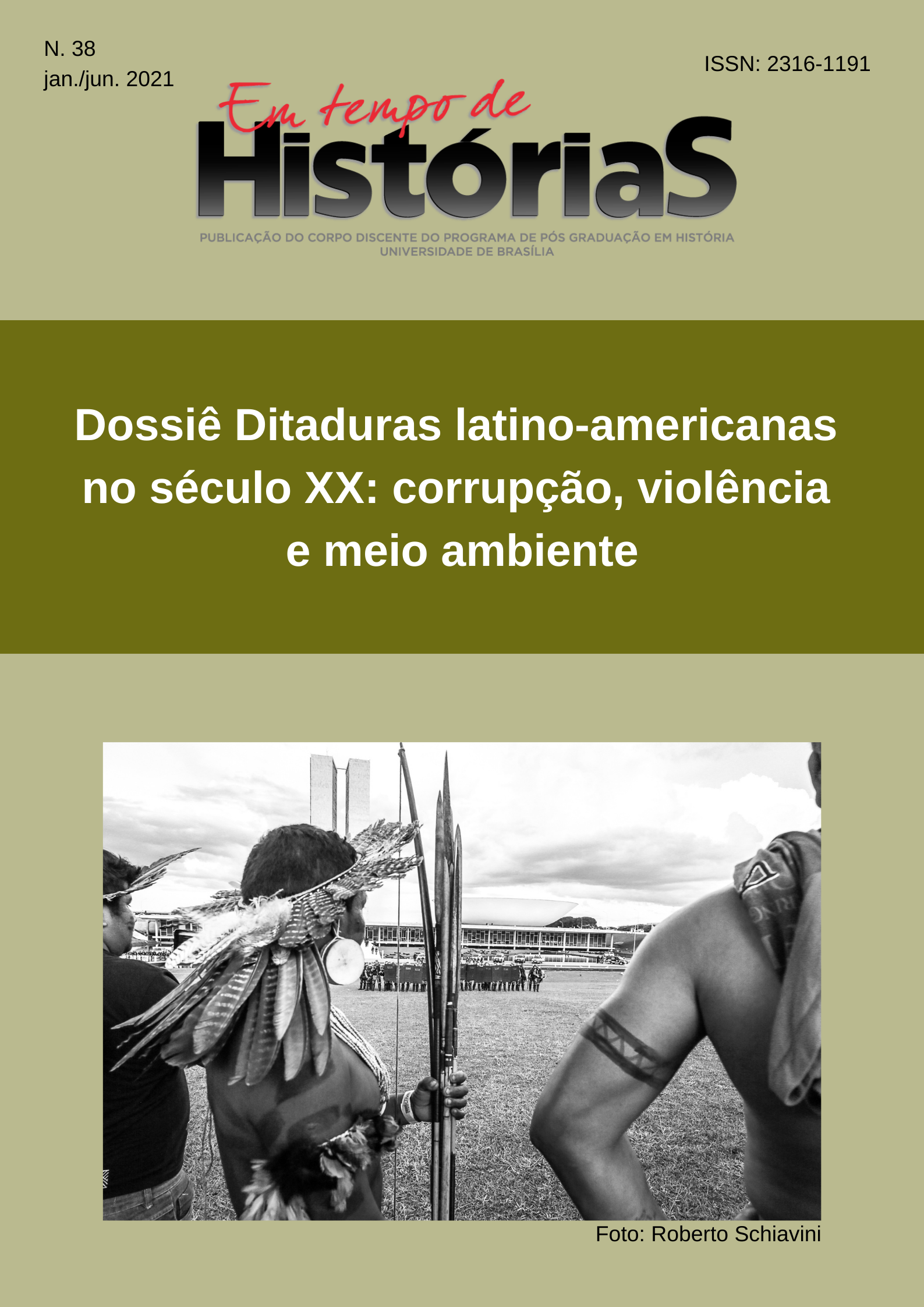Memories of the repressions from the revolutionary government against homosexuals in Cuba
a study of the testimonies from former UMAP inmates (2007-2019)
DOI:
https://doi.org/10.26512/emtempos.v1i38.35321Keywords:
Cuban Revolution. UMAPs. Repression.Abstract
In the 1960s the Military Units to Aid Production (UMAPs) were held in Cuba. Officially, these units were centers for agricultural labor whose goal was to recruit youngsters who were not considered suited for military service. However, during the period in which these units were taking place, there were accusations that the UMAPs were working as prisons for the sexually diverted, religious groups, hippies, and political prisoners. In this sense, this paper analyzes testimonies from former UMAP inmates, from the period between 2007 and 2019, about the experiences of homosexuals who were imprisoned in UMAPs and suffered repression by the revolutionary government. For that, opinion articles and news publicized in Cuban dissidents’ blogs and online newspapers, with emphasis on the subaltern memories and its ways for emersion amidst the power disputes.
Downloads
References
CANDAU, Joël. O jogo social da memória e da identidade (1): transmitir, receber. In. Memória e identidade. Trad. Maria Leticia Ferreira. 1. ed. São Paulo: Contexto, 2018, p.105-136.
CHARTIER, Roger. A História Cultural: entre práticas e representações. Tradução: Maria Manuela Galhardo. Rio de Janeiro: Bertrand Brasil, 1990.
CRUZ, Heloisa de Faria; PEIXOTO, Maria do Rosário da Cunha. Na oficina do historiador: conversas sobre História e imprensa. Projeto História, São Paulo, PUC-SP, n.35, p. 253-270, dez. 2007.
DDC. Mariela Castro dice que ha mentido y usado el nombre de su padre para defender a homosexuales [06/02/2013]. Disponível em: <http://archivo.diariodecuba.com/cuba/1360109986_2272.html>. Acesso em: 14 out. 2019.
DDC. Mariela Castro vuelve a relativizar las UMAP y dice que 'no hay tanto racismo' [16/08/2013]. Disponível em: <http://archivo.diariodecuba.com/derechos-humanos/1376685399_4671.html>. Acesso em: 28 out. 2019.
GUEVARA, Ernesto Che. El socialismo y el hombre en Cuba. Discurso proferido em 12 de março de 1965. Disponível em: <https://www.oceansur.com/catalogo/titulos/socialismo-hombre-en-cuba-folleto>. Acesso em: 31 mar. 2020.
MADERO, Abel Sierra. Academias para producir machos en Cuba. Letras libres, 21 jan. 2016. Disponível em: <https://www.letraslibres.com/espana-mexico/politica/academias-producir-machos-en-cuba>. Acesso em: 17 nov. 2019.
MADERO, Abel Sierra. La política, la religión y el hombre nuevo: al habla con Carlos Manuel de Céspedes [05/01/2014]. Disponível em: <http://archivo.diariodecuba.com/cuba/1388872692_6561.html>. Acesso em: 28 out. 2019.
MARQUES, R. A condição mariel: memórias subterrâneas da experiência revolucionária cubana (1959-1990). Tese (Doutorado em História) ”“ Universidade de Brasília, Brasilia, 2009.
ORIHUELA, José Luis. Blogs e blogosfera: o meio e a comunidade. In: ORDUÑA, Octavio. I. Rojas; ALONSO, Julio; ANTÚNEZ, José Luis; ORIHUELA, José Luis; VARELA, Juan. BLOGS: revolucionando os meios de comunicação. São Paulo: Thomson Learning, p. 01-20, 2007.
PERICÁS, Luiz Bernardo. Che Guevara e o Homem Novo. In: COGGIOLA, Osvaldo (org). Revolução Cubana: história e problemas atuais. São Paulo: Editora Xamã, 1998, p. 95-111.
POLLAK, Michael. Memória e Identidade Social. Estudos Históricos. Rio de Janeiro, v. 5, n. 10, 1992.
PONTE, Antonio José. Los Castros y los campos de concentración [07/02/2013]. Disponível em: <https://diariodecuba.com/cuba/1360209754_489.html >. Acesso em: 14 out. 2019.
PONTE, Antonio José. Qué fueron las UMAP [23/02/2014]. Disponível em: <https://diariodecuba.com/cuba/1393116891_7285.html>. Acesso em: 28 out. 2019.
SÁNCHEZ, Yoani. “El mito de Cuba ya se ha despedazado en gran parte” [14/07/2014]. Disponível em: <https://www.14ymedio.com/entrevista/Mario_Vargas_Llosa_0_1596440346.html>. Acesso em: 15 jan. 2020.
SANTOS, Giselle Cristina dos Anjos; ARAS, Lina Maria Brandão. Gênero e Revolução: o novo homem e a nova mulher na Revolução Cubana. III Seminário Nacional Gênero e Práticas Culturais: olhares diversos sobre a diferença. João Pessoa- PB, 2011.
SELIGMANN-SILVA, Marcio. O local do testemunho. Tempo e Argumento. Florianópolis, v.2, n.1, p.3-20, jan./jun. 2010.
SCOTT, Joan Wallach. Gênero: uma categoria útil de análise histórica. Educação & Realidade. Porto Alegre, vol. 20, n. 2, jul./dez. 1995, p. 71-99.
TAHBAZ, Joseph. Demystifying las UMAP: The Politics of sugar, gender, and religion in 1960s Cuba. 21 dec. 2013. Disponivel em <http://www1.udel.edu/LAS/Vol14-2Tahbaz.html>. Acesso em: 03 dec. 2019.
TARGINO, Maria das Graças. Blogs como instrumento de legitimação de lutas sociais em Cuba. Informação & Informação, Londrina, v. 18, n. 3, p. 199-221, set. 2013. Disponível em: <http://www.uel.br/revistas/uel//index.php/informacao/article/view/15134>. Acesso em: 05 dez. 2018.
UMAP CUBA 1965. El silencio que no entierra a las UMAP. Disponível em: <https://umapcuba1965.wordpress.com/2016/04/06/el-silencio-que-no-entierra-a-las-umap/>. Acesso em: 28 jan. 2020
UMAP CUBA 1965. Campos de Concentración. Disponível em: <https://umapcuba1965.wordpress.com/campos-de-concentracion/>. Acesso em: 28 jan. 2020
WIRTH, Isis. Alicia y las UMAP [31/03/2013]. Disponível em: <http://archivo.diariodecuba.com/cultura/1364763335_2560.html>. Acesso em: 14 out. 2019.
ZICMAN, Renée Barata. História através da imprensa: algumas considerações metodológicas. Projeto História. São Paulo, PUC-SP, n. 4, p. 89-102, jun. 1985.
ZAYAS, Manuel. Sin rostro ni obituario: los muertos de las UMAP [06/05/2013]. Disponível em: <http://archivo.diariodecuba.com/cuba/1367784014_3109.html>. Acesso em: 14 out. 2019.
Downloads
Published
How to Cite
Issue
Section
License
Copyright (c) 2021 Em Tempo de Histórias

This work is licensed under a Creative Commons Attribution-NonCommercial 4.0 International License.
Autores que publicam nesta revista concordam com os seguintes termos:
- Autores mantém os direitos autorais e concedem à revista o direito de primeira publicação, sendo o trabalho simultaneamente licenciado sob a Creative Commons Attribution License , licença que permite que outros remixem, adaptem e criem a partir do seu trabalho para fins não comerciais, e embora os novos trabalhos tenham de lhe atribuir o devido crédito e não possam ser usados para fins comerciais, os usuários não têm de licenciar esses trabalhos derivados sob os mesmos termos.
- Autores têm autorização para assumir contratos adicionais separadamente, para distribuição não-exclusiva da versão do trabalho publicada nesta revista (ex.: publicar em repositório institucional ou como capítulo de livro), com reconhecimento de autoria e publicação inicial nesta revista.
- Autores têm permissão e são estimulados a publicar e distribuir seu trabalho online (ex.: em repositórios institucionais ou na sua página pessoal) a qualquer ponto antes ou durante o processo editorial, já que isso pode gerar alterações produtivas, bem como aumentar o impacto e a citação do trabalho publicado (Veja O Efeito do Acesso Livre).













